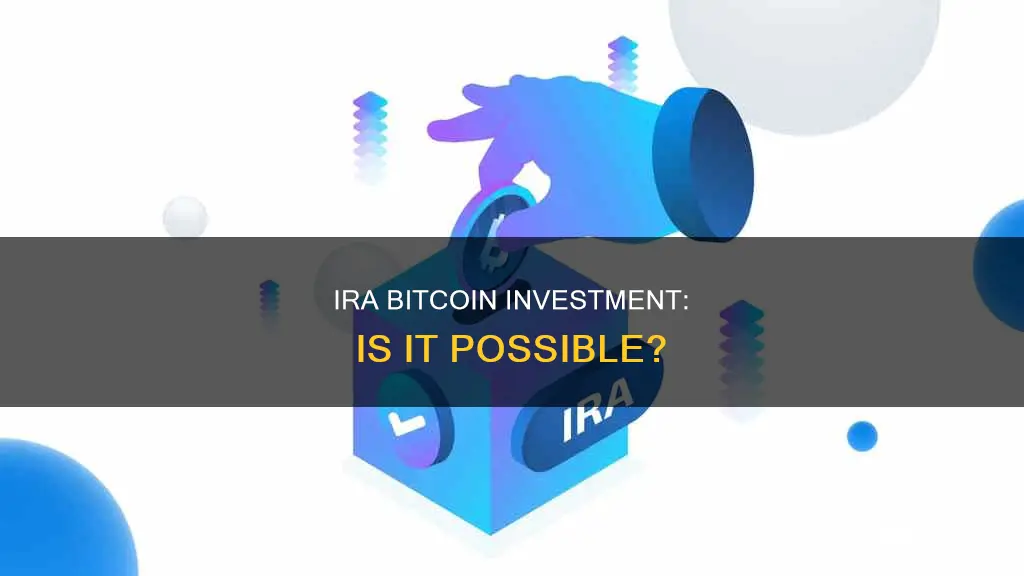
Investing in Bitcoin and other cryptocurrencies for retirement has become increasingly popular, with some companies offering crypto trading through self-directed IRAs. A Bitcoin IRA can be an attractive option for those wanting to avoid capital gains taxes while building wealth. However, experts generally warn against investing in cryptocurrency for retirement due to its volatile and speculative nature.
| Characteristics | Values |
|---|---|
| Type of IRA | Self-directed IRA |
| Tax advantages | Similar to traditional and Roth IRAs |
| Annual contribution limit (2024) | $7,000, or $8,000 if you're 50 or older |
| Additional fees | Set-up fees, transaction fees, annual account management fees |
| Custodians | Banks and other financial institutions |
| Security | Cold storage, multi-signature wallet, multi-factor authentication |
| Insurance | Up to $250 million |
| Regulation | IRS |
What You'll Learn

Crypto IRA companies
Yes, it is possible to invest in cryptocurrency in an IRA, but experts warn against it. This is because self-directed IRAs, which can be used to hold alternative investments, are generally risky and expensive to maintain.
If you are still interested in investing in cryptocurrency for retirement, you will need to find a crypto IRA company. Here are some options:
ITrustCapital
ITrustCapital is a good option for beginners. It has transparent pricing, with a 1% trade fee for crypto and gold at $50 over the spot price. It has low account and trading fees, with a $1,000 minimum investment and a $30 trade minimum. It also has good security, with deposits insured up to the maximum permitted by the FDIC.
Bitcoin IRA
Bitcoin IRA is a full-service Bitcoin IRA provider with 24/7 trading, secure cold storage, and $700 million in insurance protection. It is easy to set up and start trading on, but it has high setup and maintenance fees. It supports over 60 types of cryptocurrency.
BitIRA
BitIRA offers the highest levels of security for both crypto transactions and storage, with end-to-end insurance coverage. It has a minimum investment of $5,000.
Equity Trust
Equity Trust has been managing self-directed IRAs for over 40 years, with no transaction fees. It supports eight cryptocurrencies and has good security. However, it has high administration fees, ranging from $225 to $2,250 per year.
Coin IRA
Coin IRA is a low-cost option with good customer education. It has a $5,000 minimum investment and no setup, maintenance, or storage fees. It supports Bitcoin, Ethereum, Litecoin, and more.
Digital Asset Investment Management
Digital Asset Investment Management (DAIM) can help you manage your portfolio, diversify your investments, and plan for retirement. It can be integrated with a range of retirement accounts, including Roth and traditional IRAs.
Broad Financial
Broad Financial is a flexible platform that allows you to self-direct your IRA. It has flat fees and an unlimited selection of tokens to invest in. It also allows you to hold your private keys, giving you more control over your storage format and security.
My Digital Money
My Digital Money is a U.S.-based crypto trading platform that partners with My Equity Trust to provide self-directed crypto IRA products. It has a $50 setup fee and allows you to open a range of IRA accounts.
Small Bitcoin Investments: Are They Worth Your Money?
You may want to see also

Self-directed IRAs
A self-directed IRA is a type of individual retirement account (IRA) that allows investors to hold alternative investments, such as real estate, commodities, or cryptocurrency, which are not permitted in a traditional IRA. While self-directed IRAs offer greater flexibility and diversification, they also come with higher risks and complexities that investors should carefully consider before opening an account.
With a self-directed IRA, you are in total control of your retirement funds and investment decisions. You can choose to invest in almost any type of asset beyond the stock market, including private equity, precious metals, real estate, cryptocurrency, and more.
To open a self-directed IRA, you will need to find a custodian or trustee for your account, select your desired investments, conduct due diligence, and find a broker to execute the transactions. It's important to remember that self-directed IRAs are not offered by mainstream brokerage firms, and you will need to work with a specialty custodian.
Advantages of Self-Directed IRAs
The key advantages of self-directed IRAs include:
- Greater flexibility in investment options: You can invest in alternative assets that are not available through traditional IRAs, allowing for greater diversification.
- Tax advantages: Like traditional IRAs, self-directed IRAs offer tax-deferred growth or tax-free withdrawals, depending on the type of account you choose.
- Potential for higher returns: By investing in alternative assets, you have the opportunity to target higher rates of return compared to traditional investments.
- Alignment with your interests and expertise: You can leverage your specialized knowledge in a particular industry or asset class to make investment decisions that align with your passions and expertise.
Disadvantages of Self-Directed IRAs
However, it's important to weigh the disadvantages and risks associated with self-directed IRAs:
- Higher risk: Alternative investments tend to be riskier and more volatile than traditional investments like stocks and bonds.
- Increased responsibility and complexity: Self-directed IRAs require a higher level of dedication and expertise as you are solely responsible for investment decisions and due diligence.
- Higher fees: These accounts often come with additional fees, such as setup fees, transaction fees, and annual account management fees, which can impact your overall returns.
- Potential for fraud: Criminals may target self-directed IRA holders or encourage them to set up fraudulent investments. It's crucial to thoroughly vet all investment opportunities.
- Lack of guidance: Self-directed IRA custodians do not provide investment advice, and you will need to hire independent professionals for guidance, which can be costly.
- Loss of key advantages with certain assets: For example, investing in real estate through a self-directed IRA may result in losing tax breaks associated with owning the property outright.
Before opening a self-directed IRA, carefully consider the potential risks and advantages involved. Consult with a financial advisor or tax professional to determine if this type of account aligns with your investment strategy, risk tolerance, and financial goals.
The Ultimate Guide to Investing in Bitcoin Code
You may want to see also

The risks of investing in crypto
While investing in crypto can be rewarding, it is not without its risks. Here are some of the key risks you should be aware of before investing in cryptocurrencies:
Volatility and Market Risk
The value of cryptocurrencies is subject to extreme volatility, with prices fluctuating by hundreds of dollars in a single day. This volatility is driven by various factors, including news, sentiment, speculation, and market manipulation. Positive and negative news, such as Elon Musk's tweets or regulatory threats, can heavily impact market prices. The unregulated and anonymous nature of digital asset markets also makes them susceptible to price manipulation by crypto exchanges, media owners, and influential investors.
Regulatory Risk
The lack of a clear regulatory framework for cryptocurrencies creates uncertainty for investors. Regulators are working to establish rules for investor safety, and the successful implementation of such regulations could significantly impact crypto prices. Additionally, there is a possibility of future restrictions on cryptocurrencies, which may devalue or even ban them.
Security and Cyber-Security Risks
The decentralized nature of cryptocurrencies makes them attractive to investors; however, it also increases the risk of cyber-attacks and malicious activities. Trading platforms and third-party service providers have been vulnerable to hacking, resulting in significant financial losses. Investors need to be cautious about securing their digital wallets, as losing the private key or having it compromised can result in irreversible loss of access to their crypto assets.
Fraud and Scams
The crypto space is prone to fraudulent activities, scams, and high fees. Investors need to be vigilant about potential schemes and ensure they understand the fees associated with crypto investments, especially when using self-directed IRAs or dealing with third-party service providers.
Loss of Confidence and Adoption
Cryptocurrencies are part of a new and rapidly evolving industry. Most cryptocurrencies are not backed by central banks or international organizations, and their value is determined solely by market participants. A loss of confidence in digital currencies could lead to a collapse of trading activities and an abrupt drop in value. Additionally, the market adoption of cryptocurrencies remains low due to regulatory concerns, technology shortfalls, public misunderstandings, and the emerging nature of the technology.
Taxation and Compliance
The tax treatment of cryptocurrencies varies across jurisdictions, and investors need to seek specific tax advice to ensure compliance with the regulations in their home jurisdiction. The lack of clear regulatory frameworks makes it challenging for investors to understand their tax obligations and maintain proper records.
Complexity and Dilution
Investing in cryptocurrencies requires technical skill and a basic understanding of blockchain technology. The complexity of the cryptocurrency markets, coupled with the challenges of buying and selling, can make it difficult for investors to navigate. Additionally, the emergence of competing cryptocurrencies and "forks" in blockchain networks can lead to dilution and impact the value of existing crypto assets.
Custody and Consumer Rights
Storing cryptocurrencies securely is a significant challenge. While custody solutions offered by financial institutions are emerging, the lack of official safeguards or insurance specific to crypto assets remains a concern. Investors need to be cautious about choosing secure storage methods and protecting their assets from theft or loss.
In conclusion, while investing in crypto can offer potential gains, it is essential to carefully consider and manage these risks. Investors should conduct thorough research, understand the complexity and volatility of the market, and only invest what they can afford to lose.
El Salvador's Bitcoin Gamble: Millions Invested
You may want to see also

Tax advantages of a Bitcoin IRA
Yes, it is possible to invest in Bitcoin through an IRA. This is done through a self-directed IRA, which can hold alternative investments that are not permitted in a traditional IRA, such as real estate or commodities.
A Bitcoin IRA can provide tax advantages similar to those of traditional and Roth IRAs. Each time you sell crypto outside of an IRA, you owe capital gains tax. However, if you buy and sell crypto within a self-directed IRA, you don't pay taxes as long as the money and assets remain in your account. This is because the money in your IRA has already been taxed, and you will only pay taxes when you withdraw the funds.
Additionally, you will benefit from the compounding growth of the value you are not losing to taxes. The tax advantages of a Bitcoin IRA depend on the type of IRA you have:
- Traditional IRA: Your contributions to a traditional crypto IRA are often tax-deductible, up to a certain limit. This means that crypto within your IRA is not subject to capital gains tax or income tax. You will pay income tax when you withdraw your funds at retirement, but at this point, your tax rate will likely be significantly lower.
- Roth IRA: With a Roth IRA, you won't get an upfront tax deduction on your contributions. However, you also won't pay any taxes when you withdraw your funds at retirement. This makes sense for those who expect to be in a higher tax bracket at the point of retirement.
The Rise of Bitcoin: Why People are Investing
You may want to see also

How to open a Bitcoin IRA
Opening a Bitcoin IRA is a simple process, but it requires careful consideration of the risks involved and the different options available. Here is a step-by-step guide on how to open a Bitcoin IRA:
- Understand the Risks: Before investing in a Bitcoin IRA, it is essential to acknowledge the risks involved. Cryptocurrencies like Bitcoin are highly volatile and speculative, which means their prices can fluctuate drastically. Additionally, there are regulatory, insurance, market, and fraud risks associated with cryptocurrencies.
- Choose a Crypto IRA Company: Select a reputable company that offers Bitcoin IRA services. Examples include Bitcoin IRA, BitIRA, and Equity Trust Company. Ensure that the company is regulated, licensed, and compliant with IRS rules.
- Open a Self-Directed IRA Account: Once you have chosen a custodian, open a self-directed IRA account. This type of account allows you to invest in alternative assets beyond traditional stocks, bonds, and mutual funds.
- Fund Your Self-Directed IRA: You can fund your self-directed IRA by transferring funds from an existing IRA or 401(k), making a contribution, or rolling over a 401(k) into the new IRA.
- Purchase Bitcoin: Use the funds in your self-directed IRA to purchase Bitcoin through the custodian's platform. The process is similar to buying Bitcoin on a cryptocurrency exchange but is facilitated through the IRA custodian.
- Store Your Bitcoin Securely: Ensure that your Bitcoin investment is stored securely. Your custodian will likely offer secure storage options, such as cold storage or a multi-signature wallet, to protect your digital assets from theft.
- Understand the Tax Advantages: Investing in a Bitcoin IRA offers tax advantages similar to traditional and Roth IRAs. You can benefit from tax-free trading and avoid capital gains taxes when you sell crypto for a profit, as long as the money and assets remain in your IRA.
- Be Mindful of Fees: Self-directed IRAs typically come with additional fees, such as set-up fees, transaction fees, and annual account management fees. Make sure you understand the fee structure of your chosen Bitcoin IRA provider.
- Diversification: Remember that you should not invest your entire retirement nest egg in cryptocurrency. Maintain at least one other account for the balance of your retirement investments to ensure proper diversification and risk management.
By following these steps, you can open a Bitcoin IRA and potentially take advantage of the benefits of investing in cryptocurrency for your retirement while carefully considering the associated risks.
Blockchain's Future: Investing Beyond Bitcoin
You may want to see also
Frequently asked questions
A Bitcoin IRA is a self-directed IRA that holds cryptocurrency. Self-directed IRAs allow investors to hold alternative assets like cryptocurrency, real estate, precious metals, and collectibles, which are excluded from conventional IRAs.
First, choose a custodian that offers cryptocurrency investment options. Next, open a self-directed IRA account, then fund your account by transferring funds from an existing IRA or 401(k), making a contribution, or rolling over a 401(k) into an IRA. Finally, use the funds to purchase Bitcoin through the custodian's platform.
A Bitcoin IRA can be risky due to the volatile nature of cryptocurrencies. While traditional assets like stocks and bonds are more closely regulated, cryptocurrencies are subject to significant price fluctuations. With a Bitcoin IRA, there is a higher chance that your assets will drop in price or value.







